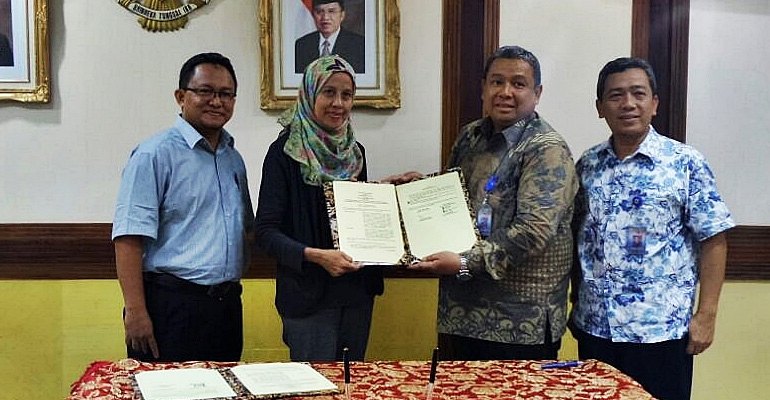Rumah Energi (BIRU) has announced that it has signed a of Memorandum of Understanding (MoU) with Perum Jasa Tirta II (PJT II) to jointly develop a biogas pilot project aimed at reducing animal manure pollution in the Cisangkuy River, West Java.

Rumah Energi (BIRU), the Indonesia Domestic Biogas Programme (IDBP) has announced that it has signed a of Memorandum of Understanding (MoU) with Perum Jasa Tirta II (PJT II), a governmental environmental agency to jointly develop a biogas pilot project aimed at reducing animal manure pollution in the Cisangkuy River, West Java.
The collaboration is closely related with the business sector of PJT II, which includes among others water utilisation, maintenance of irrigation facilities and electricity power plant, management of watershed including preservation, development, water utilisation as well as water resources, and rehabilitation of power facilities.
Improve raw water quality
One of PJT II obligations is to maintain the raw water quality so that water originating from surface water, groundwater basin and/or rainwater meets certain quality benchmarks as raw water intended for drinking water. One of PJT II’s consumers is Indonesian Regional Water Utility Company that naturally expects that the raw water supply from PJT II meet quality standards. Today however, the water of Cisangkuy River suffers from manure pollution caused by cattle farming in the surrounding area.
To tackle issue, PJT II has established collaboration with Rumah Energi.
– We strive to deal with the cow manure issue, by trying to find a simple solution, on how to turn cow manure into a biogas by applying an appropriate technology. On an advanced level, we are thinking of building a biogas power plant, commented Djoko Saputro, CEO of PJT II Jakarta, during the signing ceremony, as he explained the background of the MoU between PJT II and Rumah Energi.
Bio-fertiliser, renewable energy and conservation
The development of the biogas technology pilot project ties into PJT II conservation efforts through renewable energy. The expectation is for these activities to serve as a future example on dealing with waste management. PJT II has also encountered similar issues in other rivers such as in Cibeureum, Bogor. Furthermore, these activities are expected to be able to deal with domestic and industrial wastes.
In addition to utilising cattle manure to produce biogas, communities and farmers can also produce high quality fertilisers out of bio-slurry. Another core objective of PJT II is environmental conservation, and tree planting is a primary activity. PJT II can provide a ready market for the fertiliser generated by the constructed biogas reactors.
– Not only high quality fertilisers, but also electricity power generation. The premise here is self-sufficiency, how to fulfil operational needs out of activities developed through the utilisation of cattle manure, explained Djoko Saputro adding that PJT II aspired to develop renewable energy operations into a new company subsidiary.
For its part, Rumah Energi intends to expand the construction of biogas reactors throughout Indonesia, in addition to optimise the utilisation of bio-slurry as an organic fertiliser in order to generate commercial values and create demand by communities.
– The expectation for this pilot project is to proceed as intended and applicable in areas surrounding other rivers, as well as provide multiple impacts noticeable by both parties, said Lina Moeis, the Executive Director of Rumah Energi, explained on the expectation of the established collaboration.
Facts
About BIRU
The Indonesian Domestic Biogas Programme (IDBP) is in Indonesia better known as the BIRU programme; an acronym of Biogas Rumah, or ‘biogas for the home’. BIRU aims to promote the use of biodigesters as a local, sustainable, energy source by developing the market while working towards the development of a commercial, market-oriented sector, leading to the creation of jobs. Started in May 2009 with financial support from the Netherlands Embassy and as of November 2015, has built 16 015 biogas digesters in nine provinces in Indonesia. The IDBP is an initiative of Hivos and SNV. Closely working with the Indonesian Ministry of Energy and Mineral Resources, the programme is implemented by Yayasan Rumah Energi (YRE) with funds made available by EnDev (Energising Development), the Norwegian Embassy and partners in promoting access to a modern and sustainable form of renewable energy for rural people.


